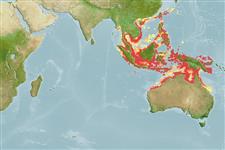Common names from other countries
>
Eupercaria/misc (Various families in series Eupercaria) >
Nemipteridae (Threadfin breams, Whiptail breams)
Etymology: Scolopsis: Name from the Greek masculine noun 'skolos' meaning 'thorn' and suffix '-opsis' (from Greek feminine n. 'opsis' meaning 'aspect', 'appearance') meaning ‘thorny appearance’ presumably referring to 'les dentelures de la préopercule, en ont aussi, et même d'épineuses, aux sous-orbitaires' mentioned by Cuvier (1814) in his designation of the genus. Name ending in -'opsis' are treated as feminine according to ICZN 1999: Article 30.1.2 (Ref. 130620).
More on author: Cuvier.
Environment: milieu / climate zone / depth range / distribution range
Ecologia
marinhas demersal; intervalo de profundidade 2 - 50 m (Ref. 9785). Tropical; 26°N - 11°S, 93°E - 130°E (Ref. 120866)
Western Pacific: Southeast Asia (Taiwan Myanmar, Vietnam, Thailand, Malaysia, Indonesia and the Philippines); with two geographic populations: Philippines and the other countries in the region.
Tamanho / Peso / Idade
Maturity: Lm ? range ? - ? cm
Max length : 25.0 cm SL macho/indeterminado; (Ref. 90102); common length : 15.0 cm SL macho/indeterminado; (Ref. 3810)
Espinhos dorsais (total) : 10; Raios dorsais moles (total) : 9; Espinhos anais: 3; Raios anais moles: 7. This species is distinguished by the following characters: head scales reaching forward to between level of anterior margin of eyes and posterior nostrils; no scales on the bony opercular ridge and lower limb of the preopercle; antrorse spine below the eye absent; pectoral-fin rays 16-18; lateral-line scales 46-49. Colour of upper body greyish-yellow, whitish below; sides of body with faint oblique blue and yellow lines, horizontal on the caudal peduncle; a narrow blue stripe joining eyes just behind nostrils; a blue stripe from middle of upper lip to lower edge of eye; upper part of pectoral-fin base with a reddish orange spot; fins are yellowish; dorsal fin with a blue stripe along its middle area; upper tip of caudal fin bright yellow; upper base of caudal fin with a blue spot (Ref. 9785, 118977).
Occurs inshore on sand or mud bottoms (Ref. 118677). Swims in small groups. Feeds on small crustaceans, mollusks and fishes. Most abundant species of Scolopsis seen in Singapore, Malaysia and Thailand. Trawled in moderate numbers along with other species in the South China Sea and Gulf of Thailand. Highly rated as a food fish, although it sells for a low price and no major fishery exists. Sold fresh and prepared steamed or used for fish balls; sometimes salted or dried (Ref. 9785).
Life cycle and mating behavior
Maturities | Reprodução | Spawnings | Egg(s) | Fecundities | Larvas
Also Ref. 103751.
Russell, B.C., 1990. FAO Species Catalogue. Vol. 12. Nemipterid fishes of the world. (Threadfin breams, whiptail breams, monocle breams, dwarf monocle breams, and coral breams). Family Nemipteridae. An annotated and illustrated catalogue of nemipterid species known to date. FAO Fish. Synop. 125(12):149p. Rome: FAO. (Ref. 3810)
Categoria na Lista Vermelha da IUCN (Ref. 130435)
CITES (Ref. 128078)
Not Evaluated
Ameaça para o homem
Harmless
Utilização humana
Pescarias: espécies comerciais
Ferramentas
Relatórios especiais
Descarregue XML
Fontes da internet
Estimates based on models
Preferred temperature (Ref.
115969): 25.7 - 29, mean 28.3 (based on 914 cells).
Phylogenetic diversity index (Ref.
82804): PD
50 = 0.5000 [Uniqueness, from 0.5 = low to 2.0 = high].
Bayesian length-weight: a=0.01380 (0.00867 - 0.02197), b=3.01 (2.88 - 3.14), in cm Total Length, based on LWR estimates for this species & Genus-body shape (Ref.
93245).
Nível Trófico (Ref.
69278): 3.9 ±0.61 se; based on food items.
Resiliência (Ref.
120179): Elevada, tempo mínimo de duplicação da população menor que 15 meses (K=0.4-1).
Fishing Vulnerability (Ref.
59153): Low to moderate vulnerability (27 of 100).
